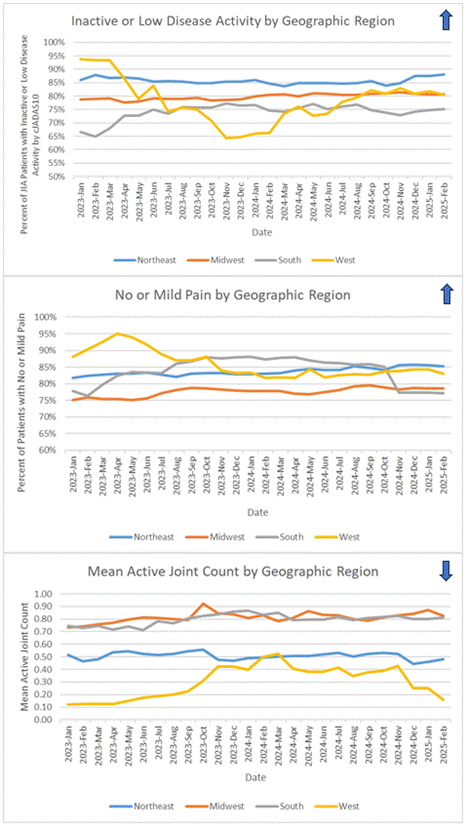Session Information
Session Type: Poster Session A
Session Time: 10:30AM-12:30PM
Background/Purpose: The Pediatric Rheumatology Care and Outcomes Improvement Network (PR-COIN) is a learning health network focused on improving healthcare delivery and outcomes in patients with juvenile idiopathic arthritis (JIA). Measured disease activity outcomes include inactive or low disease activity by the 10-joint clinical Juvenile Arthritis Disease Activity Score (cJADAS10), active joint count, and physician global assessment of disease activity (PhGA) score. PR-COIN also tracks patient-reported outcomes (PROs) including a patient/parent global assessment of overall wellbeing (PtGA) score, pain, and physical function. We sought to assess for any differences in disease activity and PROs based on geographic location of the PR-COIN sites.
Methods: We assessed PR-COIN registry data from 1/2023-2/2025. Geographical cohorts from the United States were divided into the following: Northeast, Midwest, South, and West. Cohort patient count, race, ethnicity, and insurance status were assessed. Run charts were created to portray data over time and medians were calculated. A low PtGA value indicates a score of ≤2 (0=very well, 10=very poor). No or mild pain is a value of ≤3 on the arthritis-related pain intensity scale (0=no pain, 10=severe pain). Optimal physical function is a score of 0 on the Childhood Health Assessment Questionnaire (CHAQ) or ≥40 on Patient-Reported Outcomes Measurement Information System (PROMIS) Mobility or Upper Extremity Function.
Results: There are 2-5 sites and 800-2613 patients per geographic region (Table 1). White patients were a majority of the reported race (65.2-77.0%), with a sizable percentage being other or unknown (12.2-33.0%). Run charts stratified by geographic region are depicted in Figure 1. Medians for each disease activity measure and PRO varied by geographic region (Table 2). The percent of patients in inactive or low disease activity ranged from 74.9% (South) to 85.5% (Northeast). The West had the lowest active joint count (0.33), and the Midwest and South had the highest (0.80-0.81). The Midwest and South also had the highest PhGA values (0.66-0.68) with the West having a considerably lower value at 0.22. The West also had the least percentage of patients with a low PtGA (74.0%), and the Northeast had the highest percent (80.6%). No or mild pain ranged from 77.9% (Midwest) to 85.8% (South). Optimal physical function was bimodal with the Midwest and South ranging from 60.8-61.0% and the Northeast and West with 85.5-92.9% of their patients satisfying this measure.
Conclusion: Overall, a large proportion of patients with JIA in the PR-COIN registry are doing well with inactive or low disease activity, no or mild pain, and optimal physical function. We found differences in disease activity and PROs by geographic region. Limitations include missing data, variable data quality in relation to the percent of a site’s JIA population enrolled in the PR-COIN registry, and no control for patient mix (including JIA subtype and disease duration). Next steps include assessing processes of care by geographic region, patients in rural versus urban areas, variation in medication use, impact of social drivers of health, and considering geographic-specific workgroups and/or interventions.
 Table 1. Current patient count and characteristics of patients by geographic region.
Table 1. Current patient count and characteristics of patients by geographic region.
.jpg) Table 2. Overall median performance by geographic region from January 2023 to February 2025.
Table 2. Overall median performance by geographic region from January 2023 to February 2025.
 Figure 1. Examples of stratified run charts of quality measures by geographic region.
Figure 1. Examples of stratified run charts of quality measures by geographic region.
To cite this abstract in AMA style:
Harris J, Vora S, Bingham C, Yildirim-Toruner C, Ferraro K, Friedrichsen E, Banschbach K, Burnham J, Fair D, Gilbert M, Gottlieb B, Lee T, Mannion M, Oberle E, Pan N, Rosenwasser N, Toth M, Weiss J, Morgan E. Outcomes in Juvenile Idiopathic Arthritis Based on Geographic Region in the Pediatric Rheumatology Care and Outcomes Improvement Network Registry [abstract]. Arthritis Rheumatol. 2025; 77 (suppl 9). https://acrabstracts.org/abstract/outcomes-in-juvenile-idiopathic-arthritis-based-on-geographic-region-in-the-pediatric-rheumatology-care-and-outcomes-improvement-network-registry/. Accessed .« Back to ACR Convergence 2025
ACR Meeting Abstracts - https://acrabstracts.org/abstract/outcomes-in-juvenile-idiopathic-arthritis-based-on-geographic-region-in-the-pediatric-rheumatology-care-and-outcomes-improvement-network-registry/
